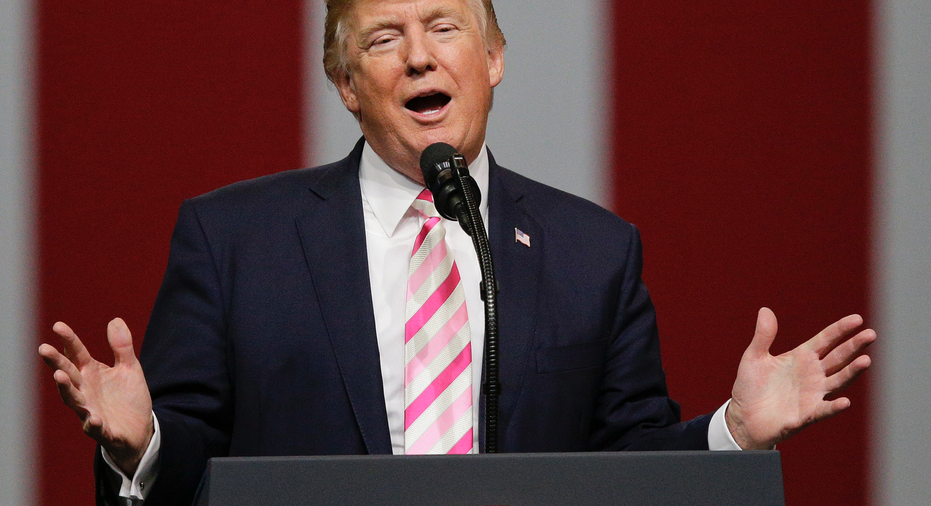Trump aims to achieve congressional balancing act on taxes

WASHINGTON – President Donald Trump says he wants to lure Democratic lawmakers to sign on to a Republican-crafted tax overhaul plan but negotiators must deal with the reality that any handouts to Democrats could quickly turn into turnoffs for the GOP.
The White House and tax-writing Republican leaders are expected to begin filling in some of the details this coming week on Trump's plan to simplify the tax system, a legislative priority for the president. The White House views this as a once-in-a-lifetime opportunity to simplify taxes and cut rates, while giving Trump a much-needed victory as the Republicans struggle to overturn the Obama health care law.
The specifics are taking shape. Trump's efforts to draw in a few Democrats could mean "you're going to lose a few Republicans," said Mark Weinberger, CEO of the accounting firm EY. But he added: "He wants to get 51 votes period in the Senate ... so it is possible you might lose a few Republicans and pick up a few Democrats who are in states that Trump won."
While the plan is not finalized, Trump is already planning to promote it heavily. He will travel to Indiana on Wednesday, and aides are discussing a televised speech, according to people familiar with White House plans.
People familiar with the plan being written entirely by Republicans said the administration is considering lowering the corporate tax rate from its current 35 percent to somewhere in the low 20s. The plan probably would seek tax cuts across the board for individuals and reduce the number of tax brackets from seven to three. The administration is considering whether to repeal the estate tax, long a Republican cause, according to these people, who spoke on condition of anonymity to discuss internal deliberations still underway.
Republican leaders had promised an overhaul that would not add to the deficit. Republicans are talking about cuts whose costs would be justified by assumptions of greater economic growth.
Lawmakers on the House Ways and Means Committee planned to meet Sunday night and Monday to discuss taxes, and House Republicans are set to meet privately away from the Capitol on Wednesday, according to aides familiar with the plans.
The White House initially pushed hard to overhaul taxes with only Republican support. But in recent months, people involved with tax discussions have found that Republican lawmakers — beyond a general desire to cut rates and simplify the tax system — also have their own divisions. The result is that Trump has been unable to deliver a tax overhaul with concrete details.
"There are Republicans, there are base Republicans, there are Trump Republicans, there are progressive Democrats, there are Blue Dog Democrats," said Douglas Holtz-Eakin, former director of the Congressional Budget Office. "There is no way to move one way or the other and not lose someone on the other end of the spectrum."
Trump has bargained on other issues with Senate Democratic leader Chuck Schumer of New York and House Democratic leader Nancy Pelosi of California. But the tax plan has been developed in private with Treasury Secretary Steve Mnuchin, White House economic adviser Gary Cohen, House Speaker Paul Ryan, Senate Majority Leader Mitch McConnell and the two Republicans leading the major tax-writing committees — Sen. Orrin Hatch of Utah and Rep. Kevin Brady of Texas.
Republicans will need to agree on a companion budget plan to get the tax effort off the ground. A series of fights awaits once the administration details the plan, including whether to limit or eliminate the itemized deduction for state and local taxes.
White House advisers expect Trump to rally support for the plan by visiting states with Democratic senators that he won last year, and states in Rust Belt such as Pennsylvania and Ohio that powered his victory. Critics of the emerging plan say it will take more than that to bring Democrats on board.
"Simply going to a red state with a blue senator and saying she better support my tax cut doesn't strike me as a very powerful weapon at all when the tax cut is a nice big fat package for wealthy people that does nothing for the working class," said Jared Bernstein, a former economic adviser to Vice President Joe Biden and a senior fellow at the Center on Budget and Policy Priorities.
In his early effort to build broader support for a tax plan, Trump has focused on Democrats such as Sens. Claire McCaskill of Missouri and Heidi Heitkamp of North Dakota during trips to their home states, which both delivered major victories for Trump in the 2016 election.
Sen. Joe Manchin, D-W.Va., said in an interview that he has told Trump he's "very receptive to reducing the corporate tax to the 25 (percent) range," and described some of the early discussions over components of the plan as "very doable."
But Manchin said he told the president the plan would need to be fiscally responsible. "One thing we don't need to raise is more debt," Manchin said.
Sen. Joe Donnelly, D-Ind., who dined with Trump and other senators earlier this month, has urged the president to make sure the tax plan addresses the outsourcing of jobs and includes provisions supporting companies that invest in U.S. jobs and penalize those that ship jobs overseas. Vice President Mike Pence pushed Donnelly during a visit to the state Friday, saying "Sen. Donnelly, we need your help too."
Heitkamp, a former North Dakota tax commissioner, has pointed to the complexities involved in any overhaul and said she'll need to see more details.
___
Associated Press writer Josh Boak contributed to this report.



















